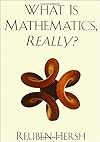

Pulse en una miniatura para ir a Google Books.
|
Cargando... What is Mathematics, Really? (1997 original; edición 1998)por Reuben Hersh
Información de la obraWhat Is Mathematics, Really? por Reuben Hersh (1997)
 Ninguno Actualmente no hay Conversaciones sobre este libro.   ) )sin reseñas | añadir una reseña
Virtually all philosophers treat mathematics as isolated, timeless, ahistorical, inhuman. In What Is Mathematics, Really? renowned mathematician Reuben Hersh argues the contrary. In a subversive attack on traditional philosophies of mathematics, most notably Platonism and formalism, he shows that mathematics must be understood as a human activity, a social phenomenon, part of human culture, historically evolved, and intelligible only in a social context. Mathematical objects are created by humans, not arbitrarily, but from activity with existing mathematical objects, and from the needs of science and daily life. Hersh pulls the screen back to reveal mathematics as seen by professionals, debunking many mathematical myths, and demonstrating how the "humanist" idea of the nature of mathematics more closely resembles how mathematicians actually work. The humanist standpoint helps him to resolve ancient controversies about proof, certainty, and invention versus discovery. The second half of the book provides a fascinating history of the "mainstream" of philosophy - ranging from Pythagoras, Plato, Descartes, Spinoza, and Kant, to Bertrand Russell, Hilbert, Carnap, and Quine. Then come the mavericks who saw mathematics as a human artifact - Aristotle, Locke, Hume, Mill, Peirce, Dewey, Wittgenstein. In his epilogue, Hersh reveals that this is no mere armchair debate, of little consequence to the outside world. Platonism and elitism fit together naturally. Humanism, on the other hand, links mathematics with people, with society, and with history. It fits with liberal anti-elitism and its historical striving for universal literacy, universal higher education, and universal access to knowledge and culture. Thus Hersh's argument has educational and political consequences. No se han encontrado descripciones de biblioteca. |
Debates activosNingunoCubiertas populares
 Google Books — Cargando... Google Books — Cargando...GénerosSistema Decimal Melvil (DDC)510.1Natural sciences and mathematics Mathematics General Mathematics Philosophy And PsychologyClasificación de la Biblioteca del CongresoValoraciónPromedio: (3.64) (3.64)
¿Eres tú?Conviértete en un Autor de LibraryThing. |
||||||||||||||||||||||||||||||||||||||||||||||||||||||||||||||||||||||||||||||||||||||||||||||||||||||||||||||||||||||||||||||||||||||